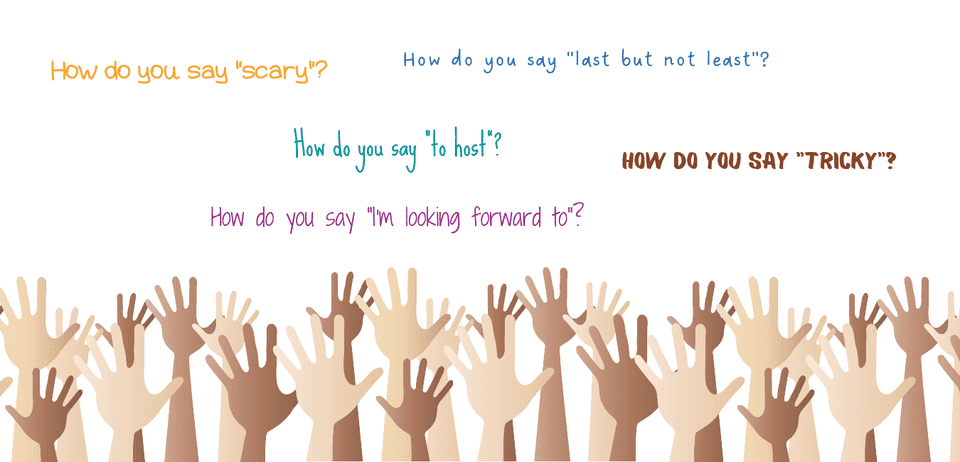Lesson
How do you say I’m looking forward to in Spanish? How do you say tricky, scary, picky?
We Spanish tutors get these questions in class a lot. Unfortunately, there is no direct translation for any of those expressions and words. But today we are going to help you find alternative ways to use them.
I'm looking forward to
This one literally translates estoy deseoso de or estoy ansioso por; however, both expressions sound excessive and a little bit intense if you ask us. So, our recommendation is not to use this expression in Spanish. We know it is hard because it is one of the most common closing lines in English, but in Spanish a simple espero (I hope) or Nos vemos pronto works just fine. Here are some examples:
- Espero saber de ti pronto.I’m looking forward to hearing from you
- Nos vemos en la próxima reunión.I’m looking forward to our next meeting.
- Estoy muy feliz de empezar este nuevo capítulo.I’m looking forward to starting this new chapter.
Those are just options, but it is also ok if you want to keep things simple and just finish your emails or texts with simple sentences: nos vemos pronto, hablamos pronto, hasta pronto.
You can use estoy deseoso de or estoy ansioso por in a natural conversation when you are talking to the person you like. For instance: Estoy ansioso por verte pronto… Grrrr!
Picky
The literal translation is quisquilloso or caprichoso. However, contrary to picky these words never sound good in a friendly conversation. Calling someone quisquilloso or caprichoso sounds a little aggressive since these words have more in common with the English word demanding.
What to say then? Most countries have a colloquial expression. For instance, in Colombia we say cositero, in Venezuela people say mingón; in Spain, tiquismiquis; in Costa Rica, delicado, etc. So, if you are visiting a Spanish speaking country, maybe it is best if you ask people about their word, although, the English one is slowly becoming more and more common because of its influence on our language through movies and music, so you may be able to use your own word and people may understand you.
To host
Judging by the number of times students ask us “how do you say to host in Spanish?” You guys seem to really like having people over and hosting parties and dinners! So, this is how you can say this depending on the context.
The literal translation is ser anfitrión de but this doesn not work everytime because it is a bit formal. It really depends on the context. Let us show you some examples:
- Vamos a tener una cena en nuestra casa esta noche.We are hosting dinner tonight.
- Ellos van a hacer una fiesta este fin de semana.They are hosting a party next weekend.
- Catar va a ser el anfitrión del próximo Mundial de fútbol/ El próximo Mundial de Fútbol va a ser en Catar/ Catar va a ser la sede del próximo mundial de fútbol.Qatar is going to be the host for the next World Cup.
- Ella es la presentadora del programa de televisión.She’s the TV show’s host.
- (Tech related words tend to be the same in Spanish)Necesito un host para mi página web.I need a company to host my website.
Tricky
Our absolute favorite word! It is a pity we don't have a literal translation for it in Spanish!
Due to our lack of vocabulary for it, you could use the words complicado, difícil, intrincado, but it doesn’t really feel the same way.
If you describe a person as tricky, the translation would be tramposo or mañoso.
We wish we had different options for you, but unfortunately, this is all we have.
Scary
This adjective does not exist in Spanish, but we have a way to translate it: dar miedo (lit. to give fear) or asustar (to scare)
- Esa película da miedo.That movie is scary.
- La situación asustaba.It was a scary situation.
The closest adjectives we have are aterrador, espantoso but these are more like terrifying.
Last but not least
The literal translation is por último pero no menos importante and some people, influenced by the English language, are starting to use this sentence as a connector to indicate their last point. To them we will say, please, stop trying to make por último pero no menos importante happen, it is not going to happen!
Mean Girls references aside, here are better and more natural options for you:_
Por último… Para terminar… Para concluir… Para cerrar…
If you really want to indicate that the last part of your speech is as important as the rest, you can say por último pero igual de importante, which sounds natural for Spanish speakers.
That's it for today. If you liked this post feel free to share and if you want to listen to this information in a funnier way, check out our video class below!
If you like this one, check out the rest on our YouTube channel!

